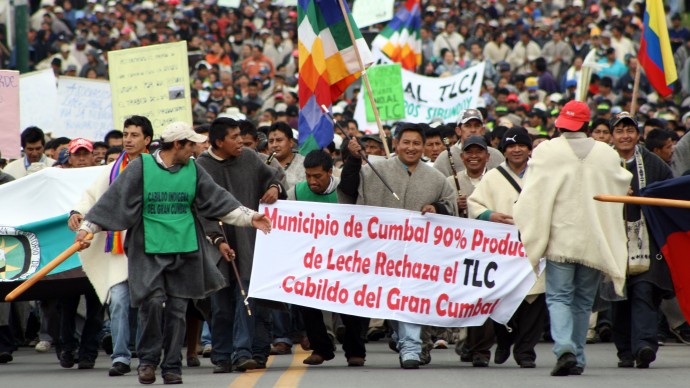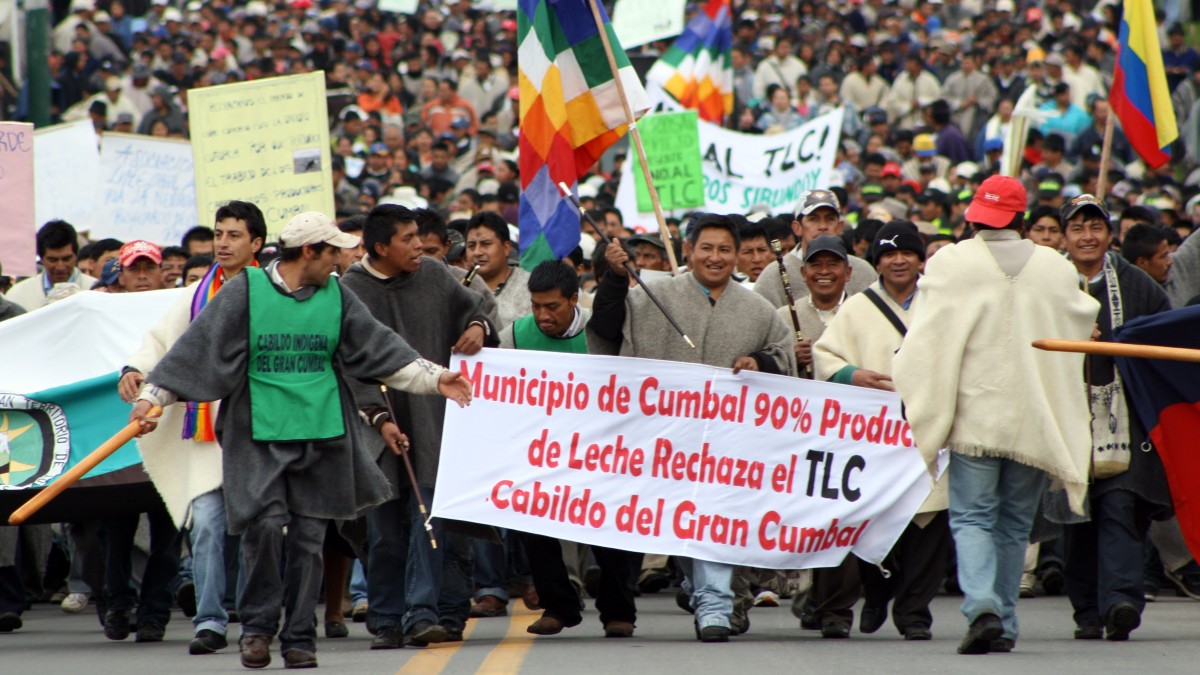
(MintPress) — Former General Motors (GM) workers began a hunger strike earlier this month to protest the wrongful termination of 200 employees at a plant in Colombia. Protesters fighting labor violations committed by the automobile manufacturer have sewn their mouths shut to fight deplorable labor conditions and demand reform.
These labor protests stem from the U.S-Colombia free trade agreement signed into law last year. While the opening of markets allows for the freer movement of capital, goods and services, the hidden costs — union busting, labor violations and environmental degradation — continue to plague Colombia and other countries that have signed free trade pacts with the U.S.
GM abuse of Colombian labor
“Colombia has become one of the most dangerous places in the world to be a labor leader,” wrote Al Jazeera reporter Carey L. Biron in a recent article.
Indeed, other industries across the South American country have been adversely affected since the free trade pact was passed by Congress.
Miguel Conde a representative for the Sintrainagro union representing workers at palm oil plantations commented on the continued disrespect for worker’s rights, saying, “We ask President (Barack) Obama to push for more guarantees for Colombian workers. In Colombia, it is easier to form an armed group than a trade union … because we still have no guarantees from the government.”
A year after the free trade pact was passed by the U.S. Congress, a number of labor violations persist despite promises that both U.S. and Colombian manufacturers adhere to a 37-point labor action plan to curb abuses. However, a review of the action plan published by the AFL-CIO earlier this month reveals that “at least nine points have yet to be fulfilled” and a number of other points remain only partially fulfilled.
In the case of General Motors, more than 200 employees were fired after reporting on-the-job injuries, including herniated discs, carpal tunnel syndrome and tendonitis. GM has responded to the accusations by firing the workers and offering an official corporate response, saying:
“GM emphasises a safety-first culture in all of our facilities around the world. As one of the first companies to adopt the Global Sullivan Principles, we also have been recognised for the quality of working conditions that exist in all of our operations.”
A special GM team of experts has been sent to Colombia on a fact finding mission to learn more about the alleged violations.
Major corporations, including Coca-Cola, have been accused of using paramilitaries and armed guards to suppress labor organizing, including the murder of prominent labor leaders.
In the past 25 years, 3,000 trade unionists have been killed in Colombia. Of this number, a mere 6 percent of cases led to a prosecution.
In 2011 alone, 29 trade unionists were murdered and 480 others were injured in violent attacks. Many of these activists were working to extend decent working conditions and a fair living wage to workers at Coca-Cola, General Motors and other multinational corporations.
Promoting free trade
While many policymakers and economists have expressed reservations about free trade agreements, corporations support the pacts, as do many in Washington.
Those proponents of free trade believe that with fewer trade barriers and more market competition, industries will operate most efficiently, allowing countries and corporations to develop a comparative advantage in producing a particular good or service.
Indeed, the limited restrictions on capital and labor produces more competition in the global marketplace and allows consumers access to a greater variety of goods at a lower price. This ideally would create a competitive global marketplace in which companies can move easily from state to state or from country to country.
However, the lessons of the Colombia free trade agreement, as well as the much larger North American Free Trade Agreement (NAFTA), demonstrate the much larger negative side effects of reducing trade barriers without ensuring proper protection of worker’s rights and the environment.
The legacy of NAFTA
The North American Free Trade Agreement was signed by Bill Clinton in 1993. The legislation created the world’s largest free economic zone, dropping virtually all trade barriers among Canada, Mexico and the U.S.
While multinational corporations profited handily from the lax trade regulations, the U.S. jobs market suffered in the 10 years following the agreement. By November 2002, the U.S. Department of Labor reported that some 500,000 U.S. jobs had been lost because of the free trade agreement.
This number may in fact be much higher as the the Economic Policy Institute in Washington reports that NAFTA may have eliminated as many as 879,000 U.S. jobs sent abroad to Canada and Mexico.
David Bacon, a reporter for the San Francisco Chronicle reports that Mexican labor suffered as well because of forced deregulation and mass privatization under the agreement.
“NAFTA’s first year saw instead the loss of more than a million jobs across Mexico. To attract investment, NAFTA-related reforms required the privatization of factories, railroads, airlines and other large enterprises. This led to huge waves of layoffs. Because unemployment and economic desperation in Mexico increased, immigration to the United States has been the only hope for survival for millions of Mexicans.”
This rapid opening of markets produces what critics call “a race to the bottom,” in which manufacturers offshore their operations to areas with fewer labor regulations. Without the protections or salary requirements of U.S. workers, goods can be produced for a fraction of the price without any consideration for decent working conditions.
The fair trade movement
In the increasingly unregulated global economy, some U.S. consumer groups have begun to promote “ethical consumption” as a means to counter the deplorable plight of foreign workers. Although more expensive than average consumer items, the fair trade movement continues to connect consumers with companies producing goods and services in an ethical, transparent manner.
While the fair trade movement remains somewhat decentralized and nebulous, the promotion of ethical consumerism represents a growing market share. Fair Trade International, one of the leading fair trade organizations, estimates that fair trade purchases grew 15 percent from 2008-2009, representing approximately $4.2 billion in annual sales.
Currently, there are several certifying agencies, creating labels for consumers to differentiate fair trade items for other goods. Although it is difficult to find big ticket items, like automobiles and computers manufactured ethically, a bevy of other consumer goods, including textiles, coffee, fruit and vegetables, now boast the “fair trade label.”
While there is no centralized labeling agency, several groups, including Fair Trade U.S.A., International Fair Trade Organization and the World Fair Trade Organization, claim to independently monitor and ensure that companies uphold their environmental commitments and commitments to workers rights.


